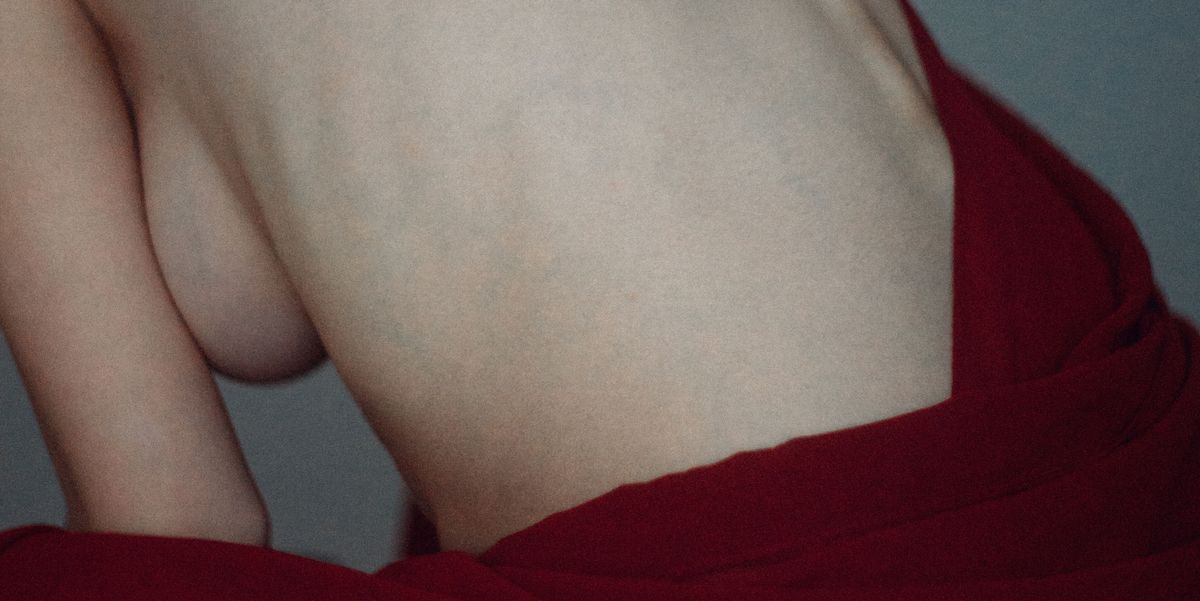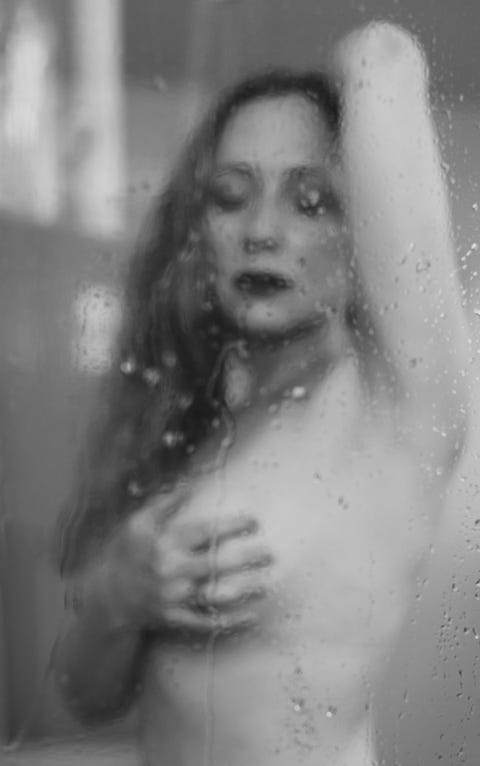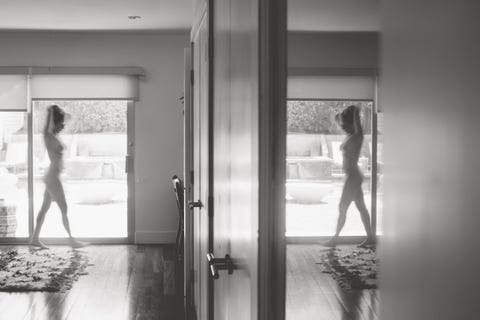Products You May Like
A handful of days after my bilateral mastectomy, my seven-year-old daughter saw my breasts. No longer voluptuous like they were when she suckled them for over a year and a half, her face crinkled. Not in disgust, but in wonderment, as she took them in. “When will you have nipples, mommy?” she asked.
After I was diagnosed last spring with stage IIb invasive lobular carcinoma, I had to decide whether or not to do a nipple sparing bilateral mastectomy or bid farewell to them. I landed on saying goodbye to my nipples to play it safe. The last thing I wanted was to undergo an extensive five-plus hour surgery and lengthy recovery, only to later find out that the cells had spread to my nipples, requiring yet another operation.
I anticipated waking from the fog of anesthesia feeling depleted. I thought I’d emerge feeling like less of a woman after having appreciated my breasts my entire adult life. Each day following surgery, I updated my Instagram community on my progress—about my physical wellbeing as well as my emotional state. To my surprise, I found myself talking about my newfound appreciation for my body and the nipplelessness I now embrace. Though my current state may be temporary (after reconstruction sometime early next year, I’ll have the option of getting tattooed nipples), it got me thinking about the extensive silence, stigma, and shame that shrouds nipplelessness. I found myself wondering why the movement is #FreetheNipple instead of #FreetheBreast, or something else entirely. Is there space for us to exhibit pride in, or even just not be ashamed of, our nippleless bodies?
I turned to other women who’ve lost their nipples during breast cancer too, to find out how this profound change has affected the way they feel about themselves in a culture that rarely, if ever, acknowledges the nippleless. “When I was first asked whether I wanted a nipple sparing mastectomy, I had no idea what that meant. I had to google the term.” says Anna Crollman, 34, who was diagnosed with stage 2b triple positive breast cancer at the age of 27. She and her medical team collectively determined it was best to get rid of her nipples, but waking up without them hit hard. “Nothing prepares you for the shock of seeing your body forever changed,” Crollman says. “I was hyperventilating and on the verge of vomiting. I sat crying on the bathroom floor in a puddle of sadness.”
This sudden, permanent change in our bodies can elicit drastic and adverse reactions. “The first time I saw my breasts I cried,” says Kelly Cook, 41, who was diagnosed with stage 1a tubular carcinoma. “They were so bruised and the expanders didn’t really give them a shape and with the lack of nipples on top of that, I just felt hideous.” Abby B, 42, who was diagnosed at age 26 with ductal carcinoma in situ (DCIS), said the difference between what she anticipated versus the reality of how things unfolded after surgery was hard to take. “I sobbed in the recovery room because I looked so different than I imagined,” Abby says. “It was awful. My expectations were way off.”
And so began the process for Abby and for all of us of navigating this new normal—in the mirror, in the bedroom, and in our own eyes. When we’ve learned through media depictions over the course of our lives that sexiness is inextricably linked with our breasts, especially nipples, coming to terms with perceived attractiveness, and a desire to share one’s body and be sexually intimate post-surgery, can be a fraught and messy road to navigate. “Even now, 15 years later, there are still certain ways I don’t want to be touched,” Abby says. “I am more self-conscious about how my body is different. My breasts and nipples used to be a major erogenous zone. It took a long time to feel comfortable being touched on my chest again.”
Crollman says she wondered if she’d ever feel truly attractive again. “I questioned my femininity at every turn” she admitted, “I struggled to feel confident looking in the mirror with the zigzagging scars across my chest and in the bedroom I found it hard to be intimate.” Cook says she also struggled to feel sexy with her breasts exposed. “How can you feel like a woman when something that is such a part of what we perceive as sexual is suddenly disfigured? I don’t think there is much that can prepare you for that,” she says. In a culture that defines female attractiveness based on having these body parts, women without them are left to make meaning of their sense of self on their own. “Instead of nipples, we have scars. With that change comes shame, insecurity, and grappling with society’s expectations of female beauty,” Crollman says. We are, however, more than the sum of our parts. As Cook aptly puts it, “A nipple doesn’t make a woman.”
But with the lack of an inclusive cultural discourse on the topic as well as a dearth of nippleless representations in society, women often end up feeling a sense of visceral shame. “Not being able to nurse my baby due to my mastectomy left me traumatized,” Abby says. “I felt like a bad mom who failed my baby. In as much as womanhood and motherhood are connected, I guess I did feel less than.” We feel “less than” because for decades media has stuck to one version of what it looks like to be a sexy woman. (I even turned to pornography to see if images of nippleless women existed, and located just two in an endless sea of naked, nipple-laden bodies.)
And sometimes we as women—consciously or not—can perpetuate the notions of a singular beauty standard as well. Movements meant to empower women might inadvertently backfire if only some women are represented and embraced. In reflecting on the #FreetheNipple movement, some breast cancer survivors said they felt shut out. “I think it’s ridiculous that according to current social media guidelines, I can show my entire breast now without being censored purely because I no longer have nipples,” Cook says. “Does that make me incapable of being seen as sexual? Am I no longer a woman in their eyes now, just a medical specimen?”
Amputated because of a life-altering disease, the last thing a woman undergoing cancer treatment wants to deal with is feeling left out, less than, or embarrassed by her body. What we crave most is a sense of community and solid support. “Campaigns and movements centered around the breasts [need to] leave room for the inclusion of those who don’t fit the mold of what a ‘normal’ woman looks like,” Crollman says.
Feelings about our revised body image evolve over time and with effort. For Crollman, the trauma of losing her nipples remains palpable decades later. “I am no longer the woman I was before cancer. My body was amputated and I will never get those breasts, nipples, or naivety back,” she tells me. “But while my body has changed, I actually found that having my breasts physically stripped away forced me to find a deeper appreciation for myself and my body image overall.” Cook is actively working to love who she is as a result of all she’s been through. “I have hope that maybe my scars can be beautiful and sexy in a different way than nipples,” she says. “Maybe my scars show power and strength and that is much more sexual and beautiful than a nipple will ever be.”
As for me, two weeks after my surgery, my daughter wanted to hug me so badly we erupted in laughter over the ridiculousness of not being able to, given the current state of my still tender body. “Can I see the scars mommy?” she asked. “Will you take off your bra, please?” I lifted my nightgown over my head and with pride, showed my daughter what life sometimes entails. Because, believe it or not, the truth is, I’ve fallen in love with my breasts-in-process. I love how they feel, their weight, their shape. I even love how they look. Never in my wildest dreams did I expect to feel this way, but here I am unclipping my bra to show my daughter what healing looks like.
This content is created and maintained by a third party, and imported onto this page to help users provide their email addresses. You may be able to find more information about this and similar content at piano.io


